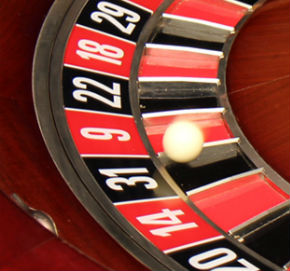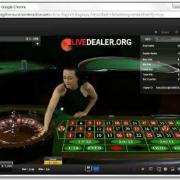Scientific paper claims roulette system producing 18% player edge
 Tell me you have a roulette system that works and I’m highly skeptical.
Tell me you have a roulette system that works and I’m highly skeptical.
Tell me you have a roulette system for sale and the dial my bullshit-o-meter jumps straight into the red zone.
Talk to me about advantage play techniques based on the physics of roulette (visual ballistics, dealer signature, section spinning etc) and I can appreciate the theoretical possibilities but the idea of effectively applying those theories in practice? This is a quantum leap.
Right or wrong I’ve always believed that roulette, while fun to play in moderation, is and always will be a house game and misguided player belief in systems like the Martingale and others like it only serve to earn casinos around the world (and online) lots of money.
BUT…
Tell me:
- you’re Professor of mathematics at the University of Western Australia, and
- together with a Professor of engineering from Hong Kong Polytechnic University,
- you’ve completed a scientific paper that has been accepted by major scientific journals, and
- your paper demonstrates a system that can be applied to a game of European roulette,
- to give a player a substantial edge over the house…
and I’m really very interested.
Professor Michael Small (UWA) and Dr Chi Kong Tse had their paper, “Predicting the outcome of roulette” published by Chaos and the American Institute of Physics late last year.
The paper demonstrates that outcomes can be predicted with enough certainly to produce a player edge, as summarized in the introduction:
“…we provide a very simple model for the motion of a roulette wheel and ball and demonstrate that knowledge of initial position, velocity, and acceleration is sufficient to predict the outcome with adequate certainty to achieve a positive expected return.”
Not a small positive expected return either. They claim their system gives players an 18% edge over the house! Expressed another way, a return to player rate of 118%. Expressed another way, $118 in the pocket for every $100 staked on the table long term!
Certainly beats the roulette returns you’re likely to be experiencing now…$97.50 back for every $100 staked.
But the paper goes beyond computer modelling and theoretical returns. The aim wasn’t just to prove that a system could determine outcomes, but also whether that determinism could actually be exploited for profit.
Guess what? They reckon it can.
“We describe two physically realizable systems to obtain this knowledge both incognito and in situ”
Small told ABC science that the model could also be used by smartphones in the future, making its application even easier.
Now I know what you’re wondering. Same thing I am.
Have the professors made a bundle with their super duper roulette system?
Can’t say I’ve heard any reports of Burswood casino getting taken for a bundle, or of a pair of professors being banned from any other casinos around the world. Maybe they’re still to come?



Leave a Reply
Want to join the discussion?Feel free to contribute!